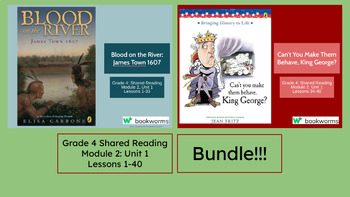"Grade 4 Shared Reading Module 2 BUNDLE" Google Slides- Bookworms Supplement
- Google Slides™

Products in this Bundle (2)
Description
Bookworms Curriculum Supplement: 4th grade Shared Reading Module 2: Unit 1- Change and Conflict. These slides are for lessons 1-40. They correlate with the books: "Blood on the River" and "Can't You Make Them Behave, King George?"
These resources are completely editable through Google Slides and they include vocabulary, written responses, first focuses, choral reading slides, timers embedded when appropriate, book photos, discussion questions, and anchor chart guides. Please know that these were designed to be a supplement to the Bookworms Curriculum and the slides were created to help with planning and presentation to young students! These are kid friendly slides to help with student engagement during instruction.
Access the full curriculum, supporting tools, and educator communities at openup.org.





